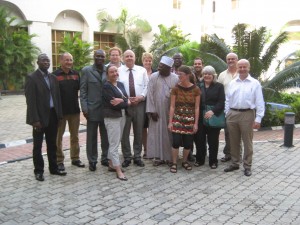Overcoming stereotypes
 A group of Nigerian journalists met with a group of German journalists in Abuja, Nigeria. The purpose: learn more about the others’ country and discuss the existing perception of Germany and Nigeria.
A group of Nigerian journalists met with a group of German journalists in Abuja, Nigeria. The purpose: learn more about the others’ country and discuss the existing perception of Germany and Nigeria.
Germans drink a lot of beer, are self-confident and ecological while Nigerians are loud, tall and full of energy. Cliched stereotypes you might say? Perhaps, but discussing mutual stereotypes was a good starting point for the recent German-Nigerian Media Dialogue in Abuja, and cause for heated discussion and a lot of laughter among the participating journalists.
It was quite a novel approach. Bring together seven German journalists and seven Nigerian journalists and get them talking for a week about each others country. Journalism trainers from DW-Akademie led the discussions, and helped to break the ice and stimulate debate with group work activities.
 The Germans had a number of questions earlier on for their Nigerian colleagues, especially about the tough working conditions facing local reporters. For example: Where does reporting have to stop in crisis? How political should or could a journalist be? And how should journalists deal with the temptation of bribery? These are questions Nigerians say they have to ask themselves almost on a daily basis. “It’s a perfect time for the media dialogue”, said radio freelance reporter Uwais Abukar Idris referring to the recent elections. The Nigerian journalists were keen to stress that even though international observers say the presidential elections were a “historic success”, several hundred people have been killed in post-election violence. Western media also often points to religious tensions as the reason for violence and riots in Nigeria. “But that’s too easy”, told Professor Andrew Haruna, one the Nigierian experts who gave a special briefing to participants. He explained the dynamics of ethnicity and geography in Nigeria’s political power struggles.
The Germans had a number of questions earlier on for their Nigerian colleagues, especially about the tough working conditions facing local reporters. For example: Where does reporting have to stop in crisis? How political should or could a journalist be? And how should journalists deal with the temptation of bribery? These are questions Nigerians say they have to ask themselves almost on a daily basis. “It’s a perfect time for the media dialogue”, said radio freelance reporter Uwais Abukar Idris referring to the recent elections. The Nigerian journalists were keen to stress that even though international observers say the presidential elections were a “historic success”, several hundred people have been killed in post-election violence. Western media also often points to religious tensions as the reason for violence and riots in Nigeria. “But that’s too easy”, told Professor Andrew Haruna, one the Nigierian experts who gave a special briefing to participants. He explained the dynamics of ethnicity and geography in Nigeria’s political power struggles.
 Of course journalism is a job and discussions between the German and the Nigerian journalists often came back to the topic of income, and in particular, the miserable wages earnt by journalists in Nigeria. This also brought up the question of bribes and so called “brown envelopes”. Across a broad spectrum of Nigeria companies, NGOs and political parties, all hand out money to journalists. Usually under the guise of covering their transportation costs. The German colleagues listened with great interest that many Nigerian journalists make a significant income from the envelopes. This was of course a surprise to the Germans but upon reflection they acknowledged that bribery exists in Germany as well ‚albeit in a different form. Travel agencies pay for expensive journalists’ trips and press-conferences are often garnished with high class presents. “We often accept those presents unthinking even though we don’t have to worry about money”, said one of the German journalists.
Of course journalism is a job and discussions between the German and the Nigerian journalists often came back to the topic of income, and in particular, the miserable wages earnt by journalists in Nigeria. This also brought up the question of bribes and so called “brown envelopes”. Across a broad spectrum of Nigeria companies, NGOs and political parties, all hand out money to journalists. Usually under the guise of covering their transportation costs. The German colleagues listened with great interest that many Nigerian journalists make a significant income from the envelopes. This was of course a surprise to the Germans but upon reflection they acknowledged that bribery exists in Germany as well ‚albeit in a different form. Travel agencies pay for expensive journalists’ trips and press-conferences are often garnished with high class presents. “We often accept those presents unthinking even though we don’t have to worry about money”, said one of the German journalists.
So did this approach work, and most importantly, will it lead to more informed reporting of Germany in Nigeria and of Nigeria in Germany? Well after four days of intensive group work and discussions, most participants were saying that they were looking beyond the stereotypes and seeing their counterparts’ countries in a new light. “I have a completely different image of my German colleagues after this conference”, said Mohammed Lawal, reporter with Federal Radio. Adding, “We’ve become a big family!” For Christian Feld, a German TV journalist, Nigeria was the first African country he had ever visited. But he’s already thinking about another trip and promised his new Nigerian friends, “I’ll be back”.
Nigeria and Germany are vastly differnt countries, but two countries that both play a leading role on their respective continents. And, no doubt, the conversations from Abuja will be continued.
Author: Christine Harjes




Feedback